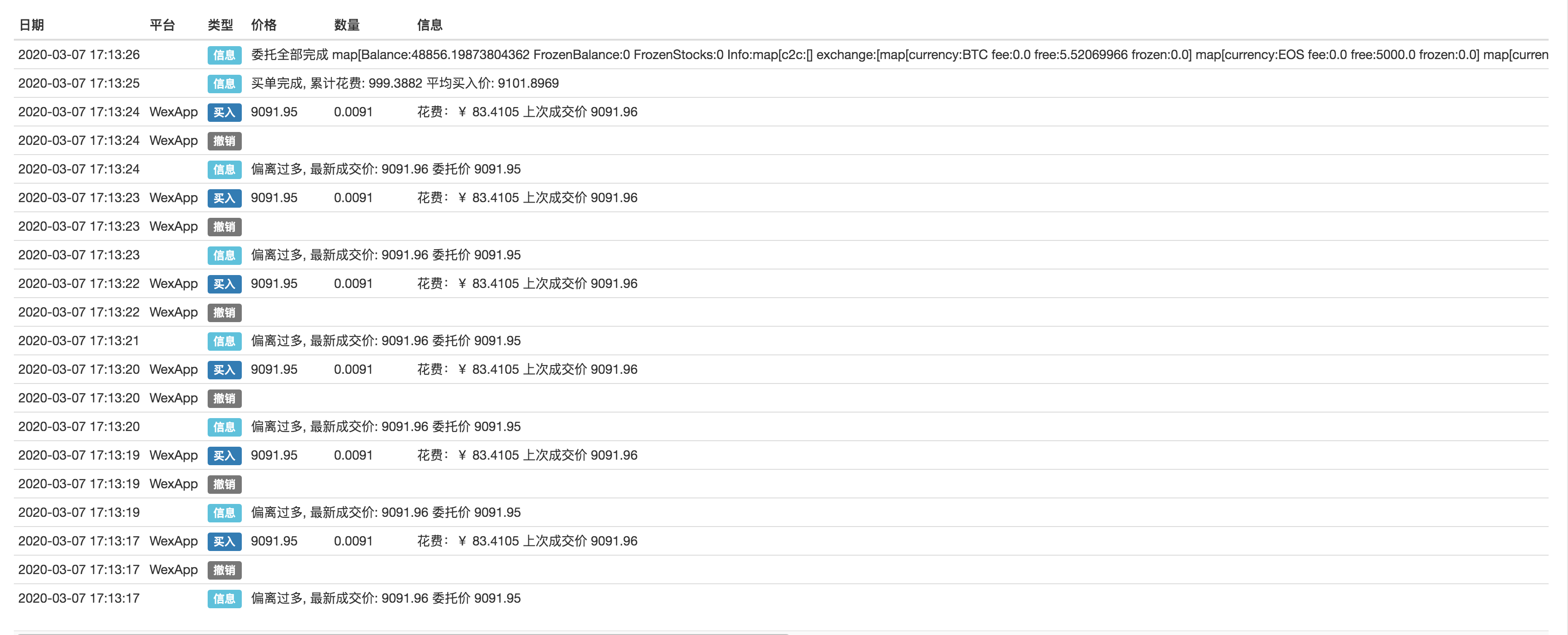পাইথন সংস্করণ আইসবার্গ কমিশন কৌশল
লেখক:ভাল, তৈরিঃ 2020-07-21 10:21:10, আপডেটঃ 2023-10-26 20:08:29
এই নিবন্ধটি প্রতিস্থাপনের জন্য দুটি ক্লাসিক কৌশল নিয়ে আসেঃ আইসবার্গ কমিশন (ক্রয় / বিক্রয়) । কৌশলটি এফএমজেড প্ল্যাটফর্মের আইসবার্গ কমিশন জাভাস্ক্রিপ্ট সংস্করণ থেকে প্রতিস্থাপিত হয়েছে। কৌশল ঠিকানাটি হলhttps://www.fmz.com/square/s:Iceberg/1
আইসবার্গ কমিশন ট্রেডিং কৌশল প্রবর্তনের জাভাস্ক্রিপ্ট সংস্করণ উদ্ধৃত করেঃ
আইসবার্গ কমিশন এই সত্যকে বোঝায় যে যখন বিনিয়োগকারীরা বাজারে অত্যধিক প্রভাব এড়াতে বড় মূল্যের লেনদেন করে, তখন বড় অর্ডার কমিশনটি স্বয়ংক্রিয়ভাবে বর্তমান সর্বশেষ ক্রয় / বিক্রয় 1 দাম এবং ব্যবসায়ীর দ্বারা নির্ধারিত দামের ভিত্তিতে একাধিক কমিশনে বিভক্ত হয়। কৌশলটি স্বয়ংক্রিয়ভাবে একটি ছোট অর্ডার কমিশন করে। যখন শেষ কমিশন সম্পূর্ণরূপে লেনদেন করা হয় বা সর্বশেষ মূল্য বর্তমান কমিশন মূল্য থেকে উল্লেখযোগ্যভাবে বিচ্যুত হয়, তখন কমিশন অপারেশন স্বয়ংক্রিয়ভাবে পুনরায় শুরু হয়।
অনেক এক্সচেঞ্জ ট্রেডিং পৃষ্ঠাগুলি আইসবার্গ কমিশন সরঞ্জামগুলির সাথে আসে, যার সমৃদ্ধ ফাংশন রয়েছে, তবে আপনি যদি নিজের প্রয়োজন অনুসারে কিছু ফাংশন কাস্টমাইজ করতে চান বা কিছু ফাংশন সংশোধন করতে চান তবে আপনার আরও নমনীয় সরঞ্জামের প্রয়োজন। এফএমজেড প্ল্যাটফর্মটি এই সমস্যাটি সঠিকভাবে সমাধানের জন্য ডিজাইন করা হয়েছে। আমাদের কৌশল স্কোয়ারে খুব বেশি পাইথন ট্রেডিং কৌশল নেই। কিছু ব্যবসায়ী যারা পাইথন ভাষা ব্যবহার করতে চান ট্রেডিং সরঞ্জাম এবং কৌশলগুলি লিখতে উদাহরণগুলি উল্লেখ করতে হবে। অতএব, ক্লাসিক আইসবার্গ কমিশন কৌশলটি পাইথন সংস্করণে পোর্ট করা হয়েছিল।
পাইথনের জন্য আইসবার্গ কমিশন - ক্রয়
import random # Import random number library
def CancelPendingOrders(): # The function of CancelPendingOrders is to cancel all pending orders of the current transaction.
while True: # Loop detection, call GetOrders function to detect the current pending order, if orders is an empty array, that is, len(orders) is equal to 0, indicating that all orders have been cancelled, you can exit the function and call return to exit.
orders = _C(exchange.GetOrders)
if len(orders) == 0 :
return
for j in range(len(orders)): # Traverse the current array of pending orders, and call CancelOrder to cancel the orders one by one.
exchange.CancelOrder(orders[j]["Id"])
if j < len(orders) - 1: # Except for the last order, execute Sleep every time and let the program wait for a while to avoid canceling orders too frequently.
Sleep(Interval)
LastBuyPrice = 0 # Set a global variable to record the the latest buying price.
InitAccount = None # Set a global variable to record the initial account asset information.
def dispatch(): # Main functions of iceberg commission logic
global InitAccount, LastBuyPrice # Reference global variables
account = None # Declare a variable to record the account information obtained in real time for comparison calculation.
ticker = _C(exchange.GetTicker) # Declare a variable to record the latest market quotes.
LogStatus(_D(), "ticker:", ticker) # Output time and latest quotation in the status bar
if LastBuyPrice > 0: # When LastBuyPrice is greater than 0, that is, when the commission has started, the code in the if condition is executed.
if len(_C(exchange.GetOrders)) > 0: # Call the exchange.GetOrders function to get all current pending orders, determine that there are pending orders, and execute the code in the if condition.
if ticker["Last"] > LastBuyPrice and ((ticker["Last"] - LastBuyPrice) / LastBuyPrice) > (2 * (EntrustDepth / 100)): # Detect the degree of deviation, if the condition is triggered, execute the code in the if, and cancel the order.
Log("Too much deviation, the latest transaction price:", ticker["Last"], "Commission price", LastBuyPrice)
CancelPendingOrders()
else :
return True
else : # If there is no pending order, it proves that the order is completely filled.
account = _C(exchange.GetAccount) # Get current account asset information.
Log("The buying order is completed, the cumulative cost:", _N(InitAccount["Balance"] - account["Balance"]), "Average buying price:", _N((InitAccount["Balance"] - account["Balance"]) / (account["Stocks"] - InitAccount["Stocks"]))) # Print transaction information.
LastBuyPrice = 0 # Reset LastBuyPrice to 0
BuyPrice = _N(ticker["Buy"] * (1 - EntrustDepth / 100)) # Calculate the price of pending orders based on current market conditions and parameters.
if BuyPrice > MaxBuyPrice: # Determine whether the maximum price set by the parameter is exceeded
return True
if not account: # If account is null, execute the code in the if statement to retrieve the current asset information and copy it to account
account = _C(exchange.GetAccount)
if (InitAccount["Balance"] - account["Balance"]) >= TotalBuyNet: # Determine whether the total amount of money spent on buying exceeds the parameter setting.
return False
RandomAvgBuyOnce = (AvgBuyOnce * ((100.0 - FloatPoint) / 100.0)) + (((FloatPoint * 2) / 100.0) * AvgBuyOnce * random.random()) # random number 0~1
UsedMoney = min(account["Balance"], RandomAvgBuyOnce, TotalBuyNet - (InitAccount["Balance"] - account["Balance"]))
BuyAmount = _N(UsedMoney / BuyPrice) # Calculate the buying quantity
if BuyAmount < MinStock: # Determine whether the buying quantity is less than the minimum buying quantity limit on the parameter.
return False
LastBuyPrice = BuyPrice # Record the price of this order and assign it to LastBuyPrice
exchange.Buy(BuyPrice, BuyAmount, "spend:¥", _N(UsedMoney), "Last transaction price", ticker["Last"]) # Place orders
return True
def main():
global LoopInterval, InitAccount # Refer to LoopInterval, InitAccount global variables
CancelPendingOrders() # Cancel all pending orders when starting to run
InitAccount = _C(exchange.GetAccount) # Account assets at the beginning of the initial record
Log(InitAccount) # Print initial account information
if InitAccount["Balance"] < TotalBuyNet: # If the initial assets are insufficient, an error will be thrown and the program will stop
raise Exception("Insufficient account balance")
LoopInterval = max(LoopInterval, 1) # Set LoopInterval to at least 1
while dispatch(): # The main loop, the iceberg commission logic function dispatch is called continuously, and the loop stops when the dispatch function returns false.
Sleep(LoopInterval * 1000) # Pause each cycle to control the polling frequency.
Log("委托全部完成", _C(exchange.GetAccount)) # When the loop execution jumps out, the current account asset information is printed.
পাইথনের জন্য আইসবার্গ কমিশন - বিক্রয়
কৌশলগত যুক্তি ক্রয়ের সাথে একই, শুধুমাত্র সামান্য পার্থক্য সহ।
import random
def CancelPendingOrders():
while True:
orders = _C(exchange.GetOrders)
if len(orders) == 0:
return
for j in range(len(orders)):
exchange.CancelOrder(orders[j]["Id"])
if j < len(orders) - 1:
Sleep(Interval)
LastSellPrice = 0
InitAccount = None
def dispatch():
global LastSellPrice, InitAccount
account = None
ticker = _C(exchange.GetTicker)
LogStatus(_D(), "ticker:", ticker)
if LastSellPrice > 0:
if len(_C(exchange.GetOrders)) > 0:
if ticker["Last"] < LastSellPrice and ((LastSellPrice - ticker["Last"]) / ticker["Last"]) > (2 * (EntrustDepth / 100)):
Log("Too much deviation, the latest transaction price:", ticker["Last"], "Commission price", LastSellPrice)
CancelPendingOrders()
else :
return True
else :
account = _C(exchange.GetAccount)
Log("The buy order is completed, and the accumulated selling:", _N(InitAccount["Stocks"] - account["Stocks"]), "Average selling price:", _N((account["Balance"] - InitAccount["Balance"]) / (InitAccount["Stocks"] - account["Stocks"])))
LastSellPrice = 0
SellPrice = _N(ticker["Sell"] * (1 + EntrustDepth / 100))
if SellPrice < MinSellPrice:
return True
if not account:
account = _C(exchange.GetAccount)
if (InitAccount["Stocks"] - account["Stocks"]) >= TotalSellStocks:
return False
RandomAvgSellOnce = (AvgSellOnce * ((100.0 - FloatPoint) / 100.0)) + (((FloatPoint * 2) / 100.0) * AvgSellOnce * random.random())
SellAmount = min(TotalSellStocks - (InitAccount["Stocks"] - account["Stocks"]), RandomAvgSellOnce)
if SellAmount < MinStock:
return False
LastSellPrice = SellPrice
exchange.Sell(SellPrice, SellAmount, "Last transaction price", ticker["Last"])
return True
def main():
global InitAccount, LoopInterval
CancelPendingOrders()
InitAccount = _C(exchange.GetAccount)
Log(InitAccount)
if InitAccount["Stocks"] < TotalSellStocks:
raise Exception("Insufficient account currency")
LoopInterval = max(LoopInterval, 1)
while dispatch():
Sleep(LoopInterval)
Log("All commissioned", _C(exchange.GetAccount))
কৌশলগত অপারেশন
এক্সচেঞ্জ টেস্ট সিমুলেট করতে WexApp ব্যবহার করুনঃ
ক্রয়ঃ

বিক্রয়ঃ

কৌশল লজিক জটিল নয়। যখন কৌশলটি কার্যকর করা হয়, তখন এটি কৌশল পরামিতি এবং বর্তমান বাজার মূল্যের উপর ভিত্তি করে ডায়নামিকভাবে অর্ডার স্থাপন এবং বাতিল করবে। যখন লেনদেনের পরিমাণ / মুদ্রার সংখ্যা প্যারামিটার সেটিং নম্বর পৌঁছায় বা কাছে আসে, তখন কৌশলটি বন্ধ হয়ে যায়। কৌশল কোডটি খুব সহজ এবং নতুনদের জন্য উপযুক্ত। আগ্রহী পাঠকরা এটি সংশোধন করতে এবং তাদের ট্রেডিং শৈলীর সাথে সামঞ্জস্যপূর্ণ একটি কৌশল ডিজাইন করতে পারেন।
- ডিইএক্স এক্সচেঞ্জের পরিমাণগত অনুশীলন (2) -- হাইপারলিকুইড ইউজার গাইড
- DEX এক্সচেঞ্জের পরিমাণগত অনুশীলন ((2) -- Hyperliquid ব্যবহারের নির্দেশিকা
- ডিইএক্স এক্সচেঞ্জের পরিমাণগত অনুশীলন (1) -- ডিওয়াইডিএক্স ভি৪ ব্যবহারকারী গাইড
- ক্রিপ্টোকারেন্সিতে লিড-লেগ আর্বিট্রেজের ভূমিকা (3)
- DEX এক্সচেঞ্জের পরিমাণগত অনুশীলন ((1)-- dYdX v4 ব্যবহারের নির্দেশিকা
- ডিজিটাল মুদ্রায় লিড-ল্যাগ স্যুটের ভূমিকা (3)
- ক্রিপ্টোকারেন্সিতে লিড-লেগ আর্বিট্রেজের ভূমিকা (2)
- ডিজিটাল মুদ্রায় লিড-ল্যাগ স্যুটের ভূমিকা (২)
- এফএমজেড প্ল্যাটফর্মের বাহ্যিক সংকেত গ্রহণ নিয়ে আলোচনাঃ কৌশলগতভাবে অন্তর্নির্মিত এইচটিটিপি পরিষেবা সহ সংকেত গ্রহণের জন্য একটি সম্পূর্ণ সমাধান
- এফএমজেড প্ল্যাটফর্মের বহিরাগত সংকেত গ্রহণের অন্বেষণঃ কৌশলগুলি অন্তর্নির্মিত এইচটিটিপি পরিষেবাগুলির সংকেত গ্রহণের সম্পূর্ণ সমাধান
- ক্রিপ্টোকারেন্সিতে লিড-লেগ আর্বিট্রেজের ভূমিকা (1)
- ট্রেডিং কৌশল একটি অ্যালার্ম ঘড়ি যোগ করুন
- সি++ ব্যবহার করে ওকেএক্স ফিউচার কন্ট্রাক্ট হেজিং কৌশল
- সক্রিয় তহবিল প্রবাহের উপর ভিত্তি করে ট্রেডিং কৌশল
- ম্যানুয়াল ট্রেডিং সহজ করার জন্য ট্রেডিং টার্মিনাল প্লাগ-ইন ব্যবহার করুন
- পরিমাণগত টাইপিং হার ট্রেডিং কৌশল
- ভারসাম্য কৌশল এবং গ্রিড কৌশল
- মাল্টি-রোবট মার্কেট কোট শেয়ারিং সলিউশন
- রোবট WeChat বার্তা ধাক্কা বাস্তবায়ন স্কিম
- ভারসাম্যপূর্ণ কৌশল এবং গ্রিড কৌশল বিস্তারিত
- গ্রাফিক্যাল মার্টিঙ্গেল ট্রেডিং কৌশল
- ক্রিপ্টোকারেন্সি ফিউচার ট্রেডিং এর যুক্তি
- নীচের আকৃতি ZDZB কৌশল
- মাল্টি-রোবট মার্কেট শেয়ারিং সমাধান
- ARMA-EGARCH মডেলের উপর ভিত্তি করে বিটকয়েন অস্থিরতা মডেলিং এবং বিশ্লেষণ
- জাভাস্ক্রিপ্ট কৌশল নকশায় সংখ্যাসূচক গণনার নির্ভুলতার সমস্যার সমাধান
- একটি স্থানীয় ফাইল মধ্যে পাইথন কৌশল encapsulate আপনি শেখান
- এফএমইএক্স ট্রেডিং সর্বোত্তম অর্ডার ভলিউম অপ্টিমাইজেশান অংশ 2 আনলক করে
- এফএমইএক্স ট্রেডিং সর্বোত্তম অর্ডার ভলিউম অপ্টিমাইজেশান আনলক করে
- কমোডিটি ফিউচার ভলিউম ফুটপ্রিন্ট চার্ট বিশ্লেষণ ও বাস্তবায়ন
- FMEX শ্রেণীবিভাগ আনলক সর্বোত্তম নিচে একক পরিমাণ অপ্টিমাইজেশন